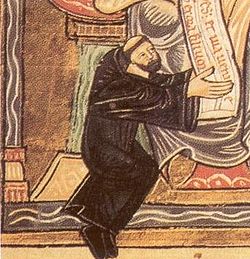St. Odo, Abbot of Cluny
| Saint Odo of Cluny | |
|---|---|

Odo of Cluny, 11th century miniature
|
|
| Born | c. 878 Le Mans, France |
| Died | November 18, 942 |
| Venerated in | Roman Catholic Church |
| Feast | November 18 |
| Patronage | for rain |
Odo of Cluny (French: Odon) (c. 878 – 18 November 942) was the second abbot of Cluny. He enacted various reforms in the Cluniac system of France and Italy. He is venerated as a Saint by the Catholic Church and Eastern Orthodox Church and his feast day is 18 November.
There is only one contemporary biography of him, the Vita Odonis written by John of Salerno.
Saint Odo was the son of Abbo, a feudal lord of Deols, near Le Mans. Abbo was a very devout man who would frequently recite the precepts of the gospel to those around him.
According to Odo's later disciple John, before Odo was born, Abbo went on his knees one Christmas in the middle of the night and asked God for the gift of a son, because he still had not had a son. His wife's name was Arenberga, and even though she was too old to bear children, she nevertheless became pregnant and gave birth to a son.
According to the same source, when Odo was a baby, his father was fearful of the child's safety and so one day when he found the baby alone, he took Odo up in his arms and prayed to St Martin of Tours saying, 'Oh, gem of saints, receive this child.‘
His father later sent Odo to receive education from a priest in a far away district. This priest one day was visited by the apostles Peter and Paul who demanded that the child be given to their service, and the priest was terrified by this apparition, and he begged the saints to let the boy free. Peter and Paul then said they would do so, but only for a time. The patron saints of Cluny Abbey were in fact Peter and Paul.
When Odo became a teenager, his father saw how physically strong he was and he felt like he had made the wrong decision by making him go into a career in the church and instead decided he should have a military career. His father then stopped his education and sent him to work as a page at the court of William the Pious, duke of Aquitaine, where he passed his days in hunting and military exercises. However, Odo felt deeply dissatisfied with his life there, and when he was sixteen he suffered so much that his father told him to pray to the saints for help. On Christmas Day he felt such deep reproach like his life was not pleasing to Christ and he then turned to the Virgin Mary, praying to her for help. But after he said this prayer he began to have a terrible pain in his head that continued for three years.
...
Wikipedia
